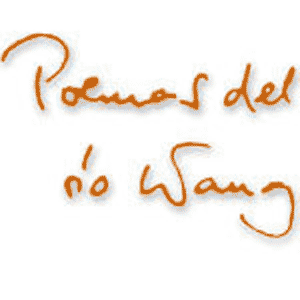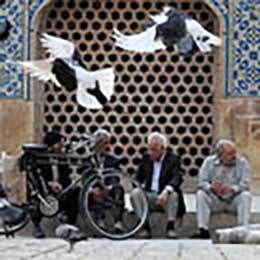As Wang Wei discovered the Western borderland of Russian language in Catalonia, so we discovered the Eastern borderland of the same language in Persia.
In Persia one can more or less get by with English. With Persian one can settle more difficult cases as well. But hearts can be really opened only with Russian.
From Tehran through Isfahan to Shiraz we were asked in the most unexpected sites: Po-russki govoritye? (And you speak in Russian too?) Each time they asked it like a child who reveals a secret treasure, a rare and precious stamp, desirous to see the other appreciating it. The positive answer was greeted with a shining smile, and then a long, warm conversation followed in Russian. The people who asked it of us were Armenians and Azeris who are just as numerous in Iran as in the former Soviet republics of Armenia and Azerbaijan. The life stories told to us revealed that they have always moved with more or less freedom between the two empires, and the Russian language brought with them from the other side of the border enabled them to rise above the status of their own minority languages, to emphasize their otherness and to proudly display their connections with that large world over the borders.
It is always a peculiar experience to speak in Russian with non-Russians. When speaking in English, German, Italian, Spanish or any other idiom, it always remains clear that this is not my own language. It is a neutral intermediary language that is perhaps a pleasure for the other to hear, and perhaps I too can convincingly use it, but it always remains something extraneous to me. Russian, however, creates fellowship, recalls childhood remembrances, revives the memory of the films, books and jokes widely known in all the bygone empire, evokes the experience of that once common world. It creates such a closeness between a Hungarian and an Armenian in Iran which would not be possible either in English or in Persian. And not only in Iran. I had the same experience when speaking with a Bulgarian professor in Mallorca, a Polish cyclist in San Marino, a Georgian diamond dealer on the Madrid-Brussels flight, or an Uzbek innkeeper in Vienna.
In Tehran we were asked in the eating-house of the market at Hafez Street by a woman vested in black chador at the neighboring table whether we can speak Russian. She related us, by fumbling the words learned in her childhood, that her parents were Azeris from the “other” Azerbaijan over the border, and they sometimes also spoke in Russian at home. In an outburst of joy she ordered for us a dish that does not figure on the menu and is only taken by locals: tah dig, the crunchy crust at the bottom of the pan after rice has been steamed.
In Shiraz the Azeri assistant of the milk bar who was just smugly replying to our questions, was all of a sudden transformed into a human being when we changed the conversation to Russian. He turned out to have worked as a confectioner in both Azerbaijans, the Iranian and the Soviet ones. Azeris are great pastry-cookers. Their capital, Tabriz is full of patisseries that almost equal to those in Vienna, and most sweet-shops are in their hands all over Iran.
In Isfahan the guardian of the Armenian cathedral of Vank warned me that it was forbidden to take photos inside the church. Later, when listening to the strange idiom of our conversation he asked us whether we also understood Russian, and as we turned out to be Hungarians, he immediately recalled some Hungarian acquaintances (“István from the Ikarus bus factory”), after which taking photos was absolutely no problem.
In Tehran, on Sunday morning four Armenian men were talking away the time in the porter’s lodge of the Sarkis Cathedral. We inquired them in Persian about where we could find a Catholic mass. When they found out from where we were, the eldest of them turned the conversation to Russian, and in this language he explained us where the Catholic church was (albeit he turned out to have been misinformed, as he pointed us to the Orthodox chapel of the Greek embassy). The other three men were watching him with deep reverence. He accompanied us quite to the entrance of the church, where he asked me in a low voice about when I had been the last time in Moscow. Some ten years ago, I said. And how is Moscow like? It developed a lot, it grew much more beautiful, I said. Slava Bogu, he said, but he was not able to tell anything else, his voice faltered with sobbing.
However, our most peculiar Russian encounter in Persia was such a beautiful round story that I will have to dedicate a separate post to it in the following days.

In my childhood in Hungary it was considered a sort of resistance not to learn the language of the occupiers. Russian was an obligatory subject from the age of eight or ten until the university degree, but after twelve or fifteen years of studies most people could not tell much more than “Alyosha idyot v kino” (Alyosha goes to movie). My mother, when seating my brothers and sisters to do their homework, always released the slogan: “Russian first!”, knowing well that they would cut it with the best conscience.
I had a different moral problem with Russian. I already at the age of seven loved Russian, the strange letters, the romantic illustrations of the cheap brochures of fables sold in the Gorky bookshop, the world of floppy-eared bear Misha, Cheburashka and Crocodile Gena, but most of all that curious alchemy by which I was able, by coupling foreign words and affixes, to tell the same like in Hungarian but in a different way, which has ever since fascinated me in each language again and again. But am I allowed to learn the language of the invaders in a good faith?
I turned with my doubts to my father who told me that Russian was not only the language of the Soviet army, but that of Tolstoy and Dostoevsky as well. With this approval I happily threw myself into the study of Russian. And thanks to this, I have since then discovered that Russian is not only the language of these great authors, but that of small people as well, and not only of Russians but, in an odd way, of many different people from Bulgaria to Beijing and from Poland to Iran, organized into a kind of a community by virtue of this intermediary language. And in this way it is also mine.
In Persia one can more or less get by with English. With Persian one can settle more difficult cases as well. But hearts can be really opened only with Russian.
From Tehran through Isfahan to Shiraz we were asked in the most unexpected sites: Po-russki govoritye? (And you speak in Russian too?) Each time they asked it like a child who reveals a secret treasure, a rare and precious stamp, desirous to see the other appreciating it. The positive answer was greeted with a shining smile, and then a long, warm conversation followed in Russian. The people who asked it of us were Armenians and Azeris who are just as numerous in Iran as in the former Soviet republics of Armenia and Azerbaijan. The life stories told to us revealed that they have always moved with more or less freedom between the two empires, and the Russian language brought with them from the other side of the border enabled them to rise above the status of their own minority languages, to emphasize their otherness and to proudly display their connections with that large world over the borders.
It is always a peculiar experience to speak in Russian with non-Russians. When speaking in English, German, Italian, Spanish or any other idiom, it always remains clear that this is not my own language. It is a neutral intermediary language that is perhaps a pleasure for the other to hear, and perhaps I too can convincingly use it, but it always remains something extraneous to me. Russian, however, creates fellowship, recalls childhood remembrances, revives the memory of the films, books and jokes widely known in all the bygone empire, evokes the experience of that once common world. It creates such a closeness between a Hungarian and an Armenian in Iran which would not be possible either in English or in Persian. And not only in Iran. I had the same experience when speaking with a Bulgarian professor in Mallorca, a Polish cyclist in San Marino, a Georgian diamond dealer on the Madrid-Brussels flight, or an Uzbek innkeeper in Vienna.
In Tehran we were asked in the eating-house of the market at Hafez Street by a woman vested in black chador at the neighboring table whether we can speak Russian. She related us, by fumbling the words learned in her childhood, that her parents were Azeris from the “other” Azerbaijan over the border, and they sometimes also spoke in Russian at home. In an outburst of joy she ordered for us a dish that does not figure on the menu and is only taken by locals: tah dig, the crunchy crust at the bottom of the pan after rice has been steamed.
In Shiraz the Azeri assistant of the milk bar who was just smugly replying to our questions, was all of a sudden transformed into a human being when we changed the conversation to Russian. He turned out to have worked as a confectioner in both Azerbaijans, the Iranian and the Soviet ones. Azeris are great pastry-cookers. Their capital, Tabriz is full of patisseries that almost equal to those in Vienna, and most sweet-shops are in their hands all over Iran.
In Isfahan the guardian of the Armenian cathedral of Vank warned me that it was forbidden to take photos inside the church. Later, when listening to the strange idiom of our conversation he asked us whether we also understood Russian, and as we turned out to be Hungarians, he immediately recalled some Hungarian acquaintances (“István from the Ikarus bus factory”), after which taking photos was absolutely no problem.
In Tehran, on Sunday morning four Armenian men were talking away the time in the porter’s lodge of the Sarkis Cathedral. We inquired them in Persian about where we could find a Catholic mass. When they found out from where we were, the eldest of them turned the conversation to Russian, and in this language he explained us where the Catholic church was (albeit he turned out to have been misinformed, as he pointed us to the Orthodox chapel of the Greek embassy). The other three men were watching him with deep reverence. He accompanied us quite to the entrance of the church, where he asked me in a low voice about when I had been the last time in Moscow. Some ten years ago, I said. And how is Moscow like? It developed a lot, it grew much more beautiful, I said. Slava Bogu, he said, but he was not able to tell anything else, his voice faltered with sobbing.
However, our most peculiar Russian encounter in Persia was such a beautiful round story that I will have to dedicate a separate post to it in the following days.

In my childhood in Hungary it was considered a sort of resistance not to learn the language of the occupiers. Russian was an obligatory subject from the age of eight or ten until the university degree, but after twelve or fifteen years of studies most people could not tell much more than “Alyosha idyot v kino” (Alyosha goes to movie). My mother, when seating my brothers and sisters to do their homework, always released the slogan: “Russian first!”, knowing well that they would cut it with the best conscience.
I had a different moral problem with Russian. I already at the age of seven loved Russian, the strange letters, the romantic illustrations of the cheap brochures of fables sold in the Gorky bookshop, the world of floppy-eared bear Misha, Cheburashka and Crocodile Gena, but most of all that curious alchemy by which I was able, by coupling foreign words and affixes, to tell the same like in Hungarian but in a different way, which has ever since fascinated me in each language again and again. But am I allowed to learn the language of the invaders in a good faith?
I turned with my doubts to my father who told me that Russian was not only the language of the Soviet army, but that of Tolstoy and Dostoevsky as well. With this approval I happily threw myself into the study of Russian. And thanks to this, I have since then discovered that Russian is not only the language of these great authors, but that of small people as well, and not only of Russians but, in an odd way, of many different people from Bulgaria to Beijing and from Poland to Iran, organized into a kind of a community by virtue of this intermediary language. And in this way it is also mine.



























































































































































Add comment